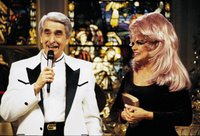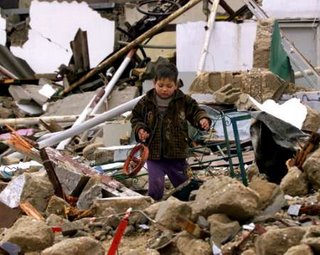How strange it seems to me now that we used the word "ordinance" instead of "sacrament." But I think this is precisely where the problem lies in much of evangelical Protestant America.
The definition of ordinance in my daughter's student dictionary says, "A statute or regulation, especially one enacted by a city government." Another dictionary adds, "A religious rite or ceremony." The definition of communion is, "The act or instance of sharing, as of thoughts, feelings, or interests". The definition of sacrament in the same dictionaries reads, "a sacred rite considered to have been instituted by Jesus" and "a manifestation of God's grace on earth."
Growing up in an SBC church I knew that the "Lord's Supper" was special, you had to be really somber and make sure that you had confessed all your sins or you might go to Hell. But I also knew that it, like baptism, was ONLY "a symbol" and that it was just bread and juice. In an effort to remove mystery we had created a superstitious symbol that had the power to curse. No wonder we Baptists don't want to take communion more than 3 or 4 times per year. In our Baptist rebellion against tradition, "church talk" and "dead liturgy" we have created new words, rites and elements that have been diluted of any meaning and simply created new traditions, jargon and liturgy that are devoid of depth. The only sacraments (in a salvation sense of the word) were the aisle walk and the sinner's prayer (neither of which can be found in Scripture).
It was at a weekly ecumenical men's prayer meeting that I first started seeing communion as communion. We believed that God's grace was being manifest to us in a tangible way as we broke bread and shared a common cup of wine. By faith we were receiving and sharing in the Body and Blood of Christ. I saw for the first time that disunity and hatred of my brothers made communion hypocrisy and me unworthy to proclaim my part in the Body. I came to understand that this group of men, my church and the Church universal is the Body of Christ. It was at this meeting that Christ's Body was discerned -- given on Earth, residing in Heaven and manifest in the Church. It was in every way a mysterious ordinance that was both a sacrament and communion. It is a weekly profession of faith and a tangible proclamation of the Gospel of Christ's body given for us and His blood shed for us.
Some years later as I had the privilege to baptize my daughter, I came to believe that baptism is more than a mere symbol or act of obedience. As I plunged my daughter's head underwater and pronounced her "buried with Christ in baptism" and raised her out of the symbolic grave "to newness of life in the name of the Father, the Son and the Holy Spirit," I knew that I had handled holy things. I had a bird's eye view as she took that first gasp of air after having been submerged in cold water, and I could imagine what the resurrection will be like. No, the water had no power to save, but something of God's grace was manifest in that moment through baptism. It is a visual proclamation of the Gospel.
What does Christ mean when He says, "where two or more are gathered in my name I am present?" In what way is Christ present with us gathered that He is not present with me when I am alone. He does not leave me, nor forsake me. I am never alone. Yet, there is a manifestation of God's presence when we are gathered in Jesus name that we do not have alone. Every Baptist I know would agree that the "presence of the Lord" can be felt in a worship service, and most have had experiences of "God's presence" in a time of prayer or intense struggle. Yet, we are afraid to say that "Christ is present" in baptism or communion.
Here is a winsome and wise quote from Millard Erickson (elder statesman of Baptist theology) on this point: "Out of a zeal to avoid the conception that Jesus is present in some sort of magical way, certain Baptists among others have sometimes gone to such extremes as to give the impression that the one place where Jesus most assuredly is not to be found is the Lord's Supper. This is what one Baptist leader termed 'the doctrine of the real absence' of Jesus Christ." (
Christian Theology [Grand Rapids, MI: Baker Books], 1123) (Thanks Ray!)
In a very real way the mission of the Church is to be a manifestation of God's grace and presence in the world. We are not God, but we are His body, His bride. The lost will never receive faith if the Gospel is not preached. The new believer will not be baptized and there is no communion outside of the Body. God's grace in the Gospel will not be witnessed in the world without the Bride. The Church is not the savior; Christ is the Savior. Jesus has not given the task to angels, but He has given the glorious task of proclaiming the Gospel to us, the Church. There then is no salvation outside of the Church and the Gospel that she preaches and proclaims in word and deed. Our task is a tangible, visible and audible proclamation of the Gospel.
I agree with my Baptist brothers in the importance of preaching. However, I do not believe that preaching has primacy. Rather I believe that preaching is sacramental in that God's grace is being manifest on the Earth in the spoken word, and that we must hear and believe the Gospel in order to be saved. Preaching, baptism and communion are opportunities for faith to be proclaimed and worked out, and God's grace to be manifest on Earth.
I have been accused of being a mystic, and to be honest I love mystery. I love scholarship as well. But I am content to leave some things in the realm of mystery. We have, in America, a need to explain everything. We simply cannot stand to have people think that we are fools. If only we could prove our faith... Have we forgotten that the Gospel is foolishness to those who are perishing, but it is the word of life to those who believe?
These mysterious ordinances are a way that we identify with Christ and separate ourselves from the World, and the Church together in word and deed proclaims the Gospel.
 34 children and 12 women died while sleeping in their apartment building that was hit in an Israeli air strike on Sunday in Qana, Lebanon.
34 children and 12 women died while sleeping in their apartment building that was hit in an Israeli air strike on Sunday in Qana, Lebanon.










.jpg)